
Earth System Governance
Scope & Guideline
Innovating Governance for a Resilient Planet
Introduction
Aims and Scopes
- Interdisciplinary Environmental Governance:
The journal emphasizes the importance of interdisciplinary approaches to governance, integrating insights from social sciences, natural sciences, law, and policy studies to tackle complex environmental challenges. - Global and Local Governance Interactions:
A core focus is on understanding the interplay between global environmental governance frameworks and local governance practices, assessing how global policies influence local contexts and vice versa. - Sustainability and Justice:
The journal addresses themes of sustainability and environmental justice, exploring how governance structures can promote equitable outcomes in the face of climate change and ecological degradation. - Innovative Governance Mechanisms:
There is a consistent focus on exploring innovative governance mechanisms, such as multi-stakeholder partnerships, transnational governance arrangements, and the role of technology in facilitating governance. - Adaptation and Resilience:
Research often focuses on adaptation strategies and resilience building in response to environmental changes, particularly in vulnerable regions and sectors.
Trending and Emerging
- Climate Change Governance:
There is a growing emphasis on governance mechanisms specifically designed to address climate change, including the role of non-state actors, international agreements, and local adaptation strategies. - Technological Innovations in Governance:
Recent articles increasingly explore the impacts of digital technologies and innovations such as blockchain on environmental governance, highlighting their potential to enhance transparency and accountability. - Biodiversity and Ecosystem Services:
The governance of biodiversity and ecosystem services has emerged as a significant theme, with research focusing on integrating biodiversity targets into broader governance frameworks and policies. - Planetary Health and Equity:
Emerging discussions around planetary health and social equity are gaining traction, reflecting an understanding of the interconnectedness of human health, environmental health, and governance. - Transnational and Multi-Level Governance:
There is a notable trend towards investigating transnational governance structures and multi-level governance approaches, which seek to coordinate efforts across different scales and jurisdictions.
Declining or Waning
- Traditional Environmental Policy Frameworks:
There has been a noticeable decline in discussions centered around traditional environmental policy frameworks, as the journal increasingly shifts towards more integrated and systemic approaches to governance. - Sector-Specific Governance Approaches:
Research focusing solely on sector-specific governance, such as agriculture or forestry, is becoming less frequent, with a trend towards more holistic perspectives that consider the interconnections between multiple sectors. - Static Governance Models:
The exploration of static or rigid governance models is decreasing, as scholars favor dynamic and adaptive governance strategies that can better respond to the uncertainties of the Anthropocene.
Similar Journals

Mitigation and Adaptation Strategies for Global Change
Fostering Innovation in Climate Adaptation and MitigationMitigation and Adaptation Strategies for Global Change is a prestigious journal published by SPRINGER, focusing on the critical areas of ecology and global change. With an impressive impact factor that places it in the Q1 and Q2 quartiles in their respective categories, this journal serves as an essential platform for researchers, professionals, and students actively engaged in addressing the challenges posed by climate and environmental changes. Since its inception in 1996, the journal has evolved to cover a wide range of interdisciplinary topics, fostering a holistic understanding of mitigation strategies and adaptation practices worldwide. Located in the Netherlands, it benefits from a robust editorial board and significant contributions from leading experts in the field. Although it does not currently offer Open Access, the journal's rigorous peer-review process ensures that only high-quality research is disseminated, making it a valuable resource for anyone seeking to remain at the forefront of global change research.
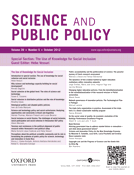
Science and Public Policy
Transforming Research into Public ImpactScience and Public Policy, published by Oxford University Press, serves as a vital conduit for research at the intersection of scientific inquiry and public governance. With its ISSN 0302-3427 and E-ISSN 1471-5430, this esteemed journal has steadily built a reputation for excellence within multiple fields, identified in 2023's quartile rankings as Q1 in Geography, Planning and Development, Q2 in Management, Monitoring, Policy and Law, and Q1 in Public Administration. The journal’s scope includes in-depth analysis and discussions on how scientific knowledge influences public policy decisions, essential for researchers, professionals, and students alike. Spanning decades since its inception in 1974, Science and Public Policy is committed to providing a platform for scholarly work that addresses contemporary issues affecting policy frameworks, making it a crucial resource for those invested in the relationship between science and society. With a consistent track record of high impact, evident in its Scopus rankings that place it in the 75th percentile for Geography and Planning, and 70th for Public Administration, the journal promises to be an indispensable part of your library.
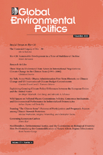
Global Environmental Politics
Promoting Informed Decision-Making for a Greener Future.Global Environmental Politics, published by MIT Press, serves as a pivotal platform for interdisciplinary research that intersects the fields of environmental science, political science, and sustainability. Established with the aim to address the most pressing global environmental challenges, this journal has achieved prestigious recognition, placing in the Q1 category across multiple disciplines such as Global and Planetary Change and Political Science and International Relations as of 2023. With an impressive Scopus rank of #23 out of 706 in Political Science and International Relations, it appeals to a diverse audience by publishing high-quality, peer-reviewed articles that contribute to knowledge and policy frameworks essential for promoting sustainability and effective governance. Researchers, professionals, and students engaged in environmental studies will find this journal invaluable for exploring innovative ideas, policy analyses, and case studies designed to foster informed decision-making in an era of rapidly changing ecological and political landscapes. Access to the journal's articles is available through standard subscription options, ensuring that critical research remains accessible to the academic community.
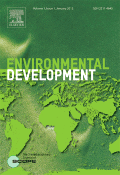
Environmental Development
Leading the charge in transformative environmental research.Environmental Development is a premier academic journal published by Elsevier, dedicated to advancing the field of environmental science through interdisciplinary research and innovative practices. With a focus on geography, planning, and development, as well as management, monitoring, policy, and law, this journal provides a rigorous platform for scholars and practitioners to share insights that shape sustainable environmental policy and practice. Holding a prestigious Q1 ranking in both relevant categories and boasting impressive Scopus rankings - 62 out of 821 in Geography and 60 out of 399 in Environmental Science - Environmental Development stands out as a critical resource for those invested in the future of our planet. The journal emphasizes impactful research that addresses contemporary challenges, fostering dialogue across disciplines and geographical boundaries. With a commitment to high-quality research, it offers an important outlet for those aiming to influence environmental policy and developmental strategies globally. Join the growing community of researchers, professionals, and students engaged in promoting sustainable environmental practices through the knowledge shared in this esteemed publication.

Journal of Environmental Policy & Planning
Exploring Interdisciplinary Approaches to Environmental PlanningJournal of Environmental Policy & Planning, published by ROUTLEDGE JOURNALS, TAYLOR & FRANCIS LTD, is a leading interdisciplinary journal dedicated to advancing the understanding of environmental policy and planning. With an ISSN of 1523-908X and an E-ISSN of 1522-7200, this esteemed journal has been instrumental in disseminating cutting-edge research since 1999. As a member of the prestigious Q1 category in Management, Monitoring, Policy and Law for 2023, it ranks #86 out of 399 in the Scopus database, placing it in the 78th percentile, which underscores its significant impact on the field. The journal's rigorous publication standards ensure that it serves as a vital resource for researchers, practitioners, and students interested in environmental governance, policy analysis, and strategic planning. While not currently operating with an open-access model, the journal maintains a commitment to scholarly excellence and societal impact through its in-depth analyses and innovative approaches to pressing environmental challenges. Based in the United Kingdom, it aims to foster dialogue and collaboration among scholars and professionals alike, making it a cornerstone for anyone engaged in the evolution of environmental policies.

Journal of Environmental Studies and Sciences
Empowering research for a greener tomorrow.Journal of Environmental Studies and Sciences, published by SPRINGER, serves as a pivotal platform for advancing the field of environmental science and related disciplines. With an ISSN of 2190-6483 and E-ISSN of 2190-6491, this esteemed journal has established itself as a reputable source of knowledge since its inception in 2011. Covering an expansive range of topics related to environmental studies, the journal has achieved a commendable position within the academic community, evidenced by its 2023 category quartiles, ranking in the Q2 tier for both Environmental Science (miscellaneous) and Geography, Planning and Development. The journal's Scopus rankings further highlight its impact within the fields of Geography, Planning and Development, and General Environmental Science, boasting a respectable percentile rank of 69th and 58th respectively. Although it does not currently offer Open Access, the Journal of Environmental Studies and Sciences remains an essential resource for researchers, professionals, and students aiming to explore critical environmental issues, engage with innovative research, and contribute to sustainable development practices. Its ongoing commitment to academic rigor ensures that it continues to play a vital role in shaping the discourse around environmental challenges and solutions.
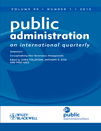
PUBLIC ADMINISTRATION
Unveiling the Dynamics of Public AdministrationPUBLIC ADMINISTRATION, published by WILEY, stands as a premier journal in the fields of Public Administration, Sociology, and Political Science, boasting an impressive impact factor and categorization within the first quartile (Q1) of both disciplines. With a legacy dating back to 1923 and continuing through to 2024, this esteemed publication delivers cutting-edge research and critical analysis that shape the understanding and practice of public governance. The journal's Scopus rankings further underscore its significance, placed in the 95th percentile for Sociology and the 90th percentile for Public Administration. While it does not offer Open Access options, its rigorous peer-review process ensures that only the most impactful and relevant studies are disseminated to its readership. PUBLIC ADMINISTRATION is essential for students, professionals, and researchers seeking to contribute to and stay informed on the latest trends, methodologies, and insights in public sector research.
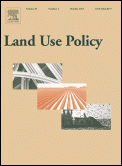
LAND USE POLICY
Leading Insights into Land Use and Conservation StrategiesLAND USE POLICY, published by ELSEVIER SCI LTD, is a premier academic journal dedicated to advancing the study of land use issues and policies, with a particular focus on sustainable management and conservation practices. Since its inception in 1984, this journal has established itself as an influential platform in the fields of Forestry, Geography, Planning and Development, and Environmental Science, consistently achieving a Q1 category ranking across various disciplines. With an impressive impact factor and recognition as a top-tier source (e.g., ranking #18/821 in Geography and Planning), it serves as a critical resource for researchers, practitioners, and policy-makers looking to address complex land use challenges. Although it does not offer open access, the journal's articles are widely accessible through institutional subscriptions, enhancing its reach. Researchers and students can find valuable insights into innovative policies and methodologies that promote sustainable land management, making LAND USE POLICY essential reading for anyone engaged in environmental studies and policy development.

Sociology of Development
Bridging theory and practice in the realm of development.Sociology of Development is a premier academic journal published by University of California Press, Journals Division, dedicated to advancing the field of development studies through innovative sociological perspectives. With an E-ISSN of 2374-538X, this journal serves as a vital platform for researchers, professionals, and students alike, providing critical insights into social, economic, and political dimensions of development from 2019 to 2024. Achieving a commendable Q2 ranking in the 2023 development category and positioned at 164 out of 306 in Scopus rankings, it demonstrates its growing influence and commitment to fostering scholarly discourse. Although not openly accessible, Sociology of Development continuously aims to enrich its readership with rigorous research articles, reviews, and theoretical debates, making it an essential resource for anyone engaged in the complex world of developmental sociology.
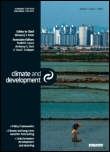
Climate and Development
Championing Research that Shapes Policy and PracticeClimate and Development is a leading interdisciplinary journal dedicated to addressing the multifaceted challenges posed by climate change and its intersection with sustainable development. Published by Taylor & Francis Ltd, this esteemed journal, with an ISSN of 1756-5529 and E-ISSN 1756-5537, provides a platform for innovative research that informs policy and practice across the globe. With its remarkable impact factor and recognized standing in the Q1 categories for Development and Geography, Planning and Development, along with notable positions in Global and Planetary Change, the journal is ranked in the top percentiles of Scopus, solidifying its influence within key academic fields. Climate and Development seeks to publish high-quality research articles, reviews, and case studies that contribute to a nuanced understanding of the implications of climate phenomena on socio-economic frameworks. This journal is essential for researchers, professionals, and students aiming to enhance their understanding of climate issues and contribute to sustainable development initiatives, ultimately striving for resilience in vulnerable communities around the world.